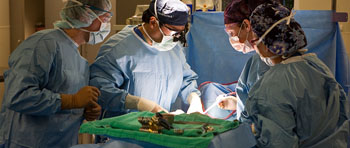Cardiothoracic Surgeons Embrace Profession
By HospiMedica International staff writers
Posted on 06 Oct 2016
Despite the intense demands associated with a career in cardiothoracic surgery, surgeons report a very high level of job satisfaction, according to a new survey.Posted on 06 Oct 2016
Researchers at the Medical University of South Carolina (MUSC; Charleston, USA) and the Society of Thoracic Surgeons (STS; Chicago, IL, USA) compiled a 63-question workforce survey that was sent to 4,343 surgeon members of the STS, with responses gathered in October 2014 from 1,262 surgeons, a return rate of 29.1%. The survey has been distributed approximately every five years since the early 1970s.

Image: New research shows cardiothoracic surgeons are very satisfied in their profession (Photo courtesy of PMG).
Demographic data revealed that the median age of active thoracic surgeons in the U.S. is 54 years. The average workweek included at least 61 hours for a majority of respondents. Case volumes, scope of practice, malpractice costs, and career satisfaction have remained relatively constant over the years. Despite the heavy workload, 73% of practicing cardiothoracic surgeons are either satisfied, very satisfied, or extremely satisfied with their current career; in fact, almost 50% would recommend that their children or grandchildren pursue a career in cardiothoracic surgery.
In addition, some surgeons reported they have postponed retirement because of a high level of career satisfaction. Many surgeons are developing skills in ultra-specialized procedures, such as robotic valve surgery and endovascular aneurysm repair, as well as embracing new technologies in order to remain competitive. The decision to pursue a career in thoracic surgery was made before or in medical school by 48.3% of surgeons, and most survey respondents had a mean of 8.7 years of residency training after medical school graduation. The survey was published on September 19, 2016, in The Annals of Thoracic Surgery.
“Cardiothoracic surgery is a fast-paced, highly technical, very satisfying specialty that should appeal to almost anyone. Cardiothoracic surgeons love their jobs; this translates into a better doctor-patient experience,” said lead author John Ikonomidis, MD, PhD, of MUSC. “The best things about being a cardiothoracic surgeon are the patients, the operative cases, teaching opportunities, and the exciting research directions we are taking.”
Related Links:
Medical University of South Carolina
Society of Thoracic Surgeons














